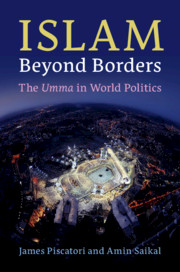6 - Conclusion
Published online by Cambridge University Press: 06 September 2019
Summary
The Conclusion highlights the simultaneity of forces — the transnational and local, the pan-Islamic and national — in keeping with much of the theoretical literature on transnationalism and globalisation. It affirms that pan-Islam has an enduring appeal that has resonance at the popular level and thereby serves as an influence on Muslim identities. Moreover, because of this very ground-level effect on self-understandings and affective attachments, it also prompts governments and Islamist groups to fulfil what is deemed to be an Islamic mission. Political actors instrumentalise the pan-Islamic sentiment as well, serving as self-appointed patrons of the umma and hoping thereby for legitimacy, especially at home, and the extension of influence abroad. These factors reveal, the chapter argues, a built-in territorial dimension that, without denying the emergence of cosmopolitan discourses and networks, suggests that, to find the umma today, we need to take into account rooted contestations.
Keywords
- Type
- Chapter
- Information
- Islam beyond BordersThe Umma in World Politics, pp. 160 - 170Publisher: Cambridge University PressPrint publication year: 2019

